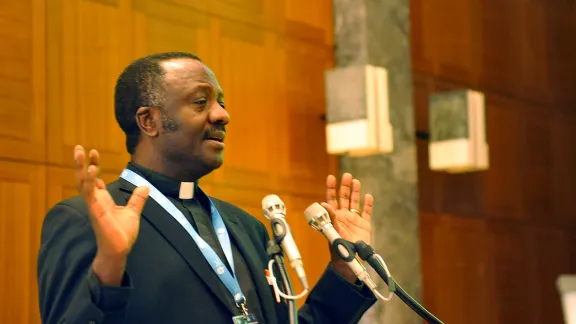
Rev. Dr Fidon Mwombeki, director of the LWF Department for Mission and Development, presents a 70-year trajectory of mission thinking and activities in the LWF, during the Consultation on Contemporary Mission in Global Christianity in Geneva. Photo: LWF/S. Gallay
Junge: Proclaim, serve without exclusion and “witness with joy and hope”
(LWI) – Speakers at The Lutheran World Federation (LWF) Consultation on Contemporary Mission in Global Christianity which began here yesterday, emphasized the centrality of mission for all churches in the global LWF communion, and the joint responsibility to bear prophetic witness to the gospel of Jesus Christ.
“God’s call into mission has not ceased. Because of that we can’t but proclaim. Because of that we can’t but serve the needy. And because of that we can’t but speak out to uphold the rights of the poor,” LWF General Secretary Rev. Dr Martin Junge said in his sermon at the opening eucharitisic worship in the Ecumenical Center Chapel in Geneva.
He reminded the congregation of 80 representatives from LWF member churches and mission agencies that the primary call for churches and Christians is to both become and remain “active witnesses of God’s transforming action in our world.”
Junge’s message, based on Romans 1:16-17, underlined Lutheran churches’ mission to proclaim the gospel boldly as people called by God’s grace alone, liberated to serve without exclusion, and “witness with joy and hope.” He called for service to those who have been marginalized as “nobodies” by human injustice, and urged resistance to the notion that the value of human beings and creation “can be turned into coins and currencies.”
The gospel, the general secretary added, “challenges our ongoing attempts of self-justification and self-righteousness, so as to fully rely on God’s justice and God’s righteousness.”
God’s call into mission has not ceased. Because of that we can’t but proclaim. Because of that we can’t but serve the needy. And because of that we can’t but speak out to uphold the rights of the poor.
Commissioned to accompany each other
In a video greeting to the participants, LWF President Bishop Dr Munib A. Younan recalled that the LWF understands itself as “a communion of churches, because we are commissioned together to accompany each other in mission.” The call to proclaim the gospel, serve the needy and advocate “is not an activity but the essence of the church; and there can be no church without mission,” he added.
Younan, bishop of the Evangelical Lutheran Church in Jordan and the Holy Land, said Christ’s call to the church today was to explore new ways and means of articulating mission “in our broken world, in a time of extremism, secularism and indifference to religion.”
Trajectory of mission in the LWF
Rev. Dr Fidon Mwombeki, director of the Department for Mission and Development, articulated the trajectory of mission thinking and activities in the LWF, beginning with the predecessor body The Lutheran World Convention, which in 1946 declared mission as one of the driving forces for Lutheran identity. The 1947 founding Assembly of the LWF identified churches’ “common initiatives in mission” as one of the four foundational pillars in a divided post-World War II context, and defined one of LWF’s role as the agent for missionary cooperation between member churches and their related mission agencies, he said.
Debate about the relevance of the term “mission” with its connotation of “from rich North to poor South” eclipsed at the 1970 Assembly in Evian, France, with churches clamoring for equal status and treatment, Mwombeki explained. At the assembly, Tanzanian Bishop Josia Kibira, who was elected to chair the newly formed Commission on Church Cooperation, and later became LWF President, reminded churches of the need for missionaries in all regions of the world.
Subsequent LWF assemblies and regional consultations sustained the debate on mission with the 1988 publication “Together in God’s Mission: An LWF Contribution to the Understanding of Mission” as one of the milestones, followed in later years by numerous LWF documentations on mission and diakonia.
However, Mwombeki noted that within its history, the LWF at all its assemblies discussed the issue of mission except at the 2010 Eleventh Assembly in Stuttgart. As the LWF prepares for its Twelfth Assembly in 2017 “the pendulum should come back into balance between the traditional “‘proclamation’ and ‘social action’ sides, as we once again emphasize that the core of the one gospel comprises both the spiritual and the material wholeness of the human being,” he concluded.
The consultation continues in plenary and group discussions including presentations from each of the seven LWF regions, and keynote address by Rev. Dr Rafael Malpica-Paddila, director for Global Mission at the Evangelical Lutheran Church in America.

Participants representing all LWF's regions exchange views at table talks during the LWF consultation on Contemporary Mission in Global Christianity, 17-18 November, in Geneva. Photo: LWF/S. Gallay


